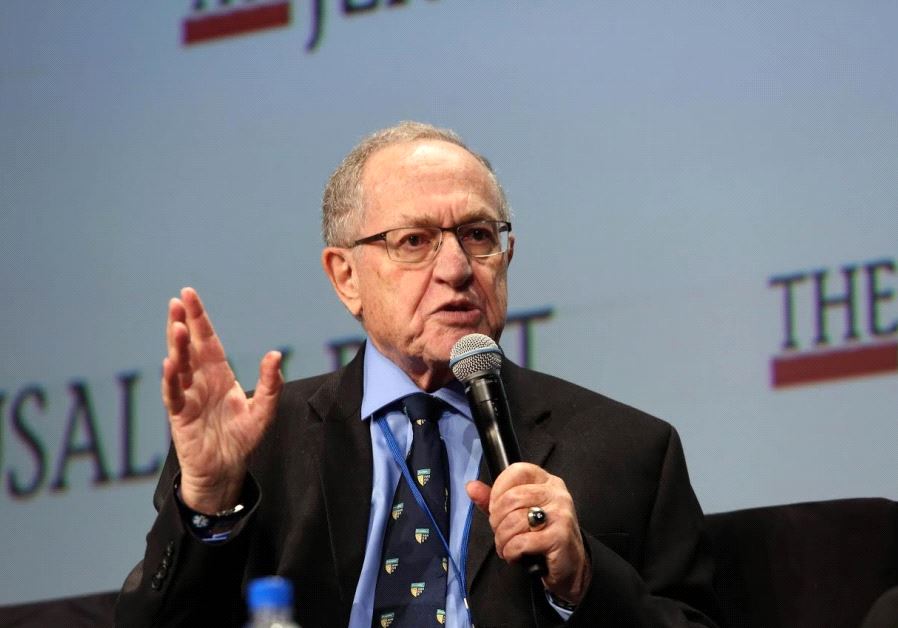Alan Dershowitz publishes open letter to A-G defending Netanyahu

Alan Dershowitz at the Jerusalem Post Conference in New York, May 7, 2017. (photo credit: SIVAN FARAG)
Alan Dershowitz, one of the most prominent Jewish lawyers in the United States and in the world, published an open letter on Wednesday addressed to Attorney-General Avichai Mandleblit, in which he defended Prime Minister Benjamin Netanyahu from the ongoing investigations against him.
Mandelblit is expected to publish his decision on whether or not to indict Netanyahu by the middle of next week, with possible consequences on the current election cycle.
Dershowitz, in his letter published in Haaretz, negates charges of bribery and fraud against Netanyahu and said that an indictment against the prime minister would threaten the democratic process.
“To bring down a duly elected prime minister on the basis of an expansive and unprecedented application of a broad and expandable criminal statute endangers democracy,” Dershowitz wrote.
The Harvard professor expanded on the three cases – 1000, 2000 and 4000, which might bring forth an indictment – and rejected the legitimacy of the charges based on the existing evidence.
In Case 1000, in which Netanyahu is accused of handing out favors in return for gifts – cigars and champagne – from friends, Dershowitz wrote that there is no applicable law that defines the line of what would constitute bribery in this case.
“The accusation is that Netanyahu took too many such gifts and made too many favors in return. But how many are too many? The law doesn’t say,” Dershowitz asserted, adding that “no one should be charged with a crime unless he has willfully crossed a bright line and plainly violated a serious criminal statute.”
Cases 2000 and 4000, in which the prime minister is accused of supporting legislation in return for positive media coverage, “pose even greater dangers to democratic governance and civil liberties,” he said.
Dershowitz wrote that no substantial proof can be brought forth that a law was broken and that the complex relationship between political and media figures cannot be subject to prosecution. Instead this should be decided upon by the public, who can choose to vote in favor or against the representatives who “transgress” such statutes.
In Case 2000, Netanyahu allegedly supported a law that would curtail Israel Hayom to gain fairer coverage from its competitor Yediot Aharonot in a deal struck with its publisher Noni Mozes. Netanyahu ultimately voted against the law, leaving prosecutors to deal with possible motives, but found no real evidence.
Similarly, Dershowitz noted, in Case 4000 in which Netanyahu allegedly supported regulatory decisions made by civil servants in return for fairer coverage, a prosecution would be based on “speculation concerning the state of mind of the participants.”
“The relationship between politics and the media – and between politicians and publishers – is too nuanced, subtle and complex to be subject to the heavy hand of criminal law,” he wrote.
Dershowitz asserted that politicians’ decisions are often motivated by the coverage they would receive from the media and to achieve some sort of self-serving result.
“To empower prosecutors to probe these mixed motivations is to empower them to exercise undemocratic control over crucial institutions of democracy,” he reiterated.
The nature of politics, he added, and the relationship of it with media institutions to ‘”scratch my back and I will scratch yours’ is as Israeli as falafel and as American as apple pie.”
Dershowitz called on Mandelblit to let Netanyahu “continue his important work,” and to let Israelis decide at the ballot whether they accept the prime minister’s behavior or not.
“To criminalize these political differences is to endanger democracy and freedom of the press,” Dershowitz wrote.
Join Jerusalem Post Premium Plus now for just $5 and upgrade your experience with an ads-free website and exclusive content. Click here>>






Comments are closed.